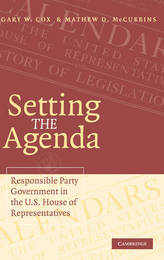
|
Setting the Agenda: Responsible Party Government in the U.S. House of Representatives
Hardback
Main Details
| Title |
Setting the Agenda: Responsible Party Government in the U.S. House of Representatives
|
| Authors and Contributors |
By (author) Gary W. Cox
|
|
By (author) Mathew D. McCubbins
|
| Physical Properties |
| Format:Hardback | | Pages:352 | | Dimensions(mm): Height 234,Width 156 |
|
| ISBN/Barcode |
9780521853798
|
| Classifications | Dewey:328.73072 |
|---|
| Audience | | Professional & Vocational | |
|---|
| Illustrations |
21 Tables, unspecified; 20 Line drawings, unspecified
|
|
Publishing Details |
| Publisher |
Cambridge University Press
|
| Imprint |
Cambridge University Press
|
| Publication Date |
26 September 2005 |
| Publication Country |
United Kingdom
|
Description
Scholars of the U.S. House disagree over the importance of political parties in organizing the legislative process. On the one hand, non-partisan theories stress how congressional organization serves members' non-partisan goals. On the other hand, partisan theories argue that the House is organized to serve the collective interests of the majority party. This book advances our partisan theory and presents a series of empirical tests of that theory's predictions (pitted against others). It considers why procedural cartels form, arguing that agenda power is naturally subject to cartelization in busy legislatures. It argues that the majority party has cartelized agenda power in the U.S. House since the adoption of Reed's rules in 1890. The evidence demonstrates that the majority party seizes agenda control at nearly every stage of the legislative process in order to prevent bills that the party dislikes from reaching the floor.
Author Biography
Gary W. Cox is a professor of political science at the University of California, San Diego. In addition to numerous articles in the areas of legislative and electoral politics, he is author of The Efficient Secret (winner of the Samuel H. Beer dissertation prize in 1983), coauthor of Legislative Leviathan (winner of the Richard F. Fenno Prize in 1993), and author of Making Votes Count: Strategic Coordination in the World's Electoral Systems (1997), which was awarded APSA's awards for the best book in political science (Woodrow Wilson Foundation Award), the best book in comparative politics (Gregory Luebbert Prize), and for the best book in political economy. His latest book, Elbridge Gerry's Salamander, analyzes the political consequences of the reapportionment revolution in the United States. Cox is a former Guggenheim Fellow and was elected to the American Academy of Arts and Sciences in 1996. Mathew D. McCubbins is a professor of political science at the University of California, San Diego. His authored works include Legislative Leviathan: Party Government in the House (1993); Under the Watchful Eye: Managing Presidential Campaigns in the Television Era (1992); Recent co-edited books include The Origins of Liberty: Political and Economic Liberalization in the Modern World (1997); and Elements of Reason: Cognition, Choice, and the Bounds of Rationality (2000). His most recent book is Stealing the Initiative: How State Government Responds to Direct Democracy (2001) with Elisabeth Gerber, Arthur Lupia, and D. Roderick Kiewiet. McCubbins is also the author of numerous articles in journals such as Legislative Studies Quarterly; Journal of Law, Economics, and Organization; Law and Contemporary Problems; and the American Journal of Political Science. He is the coordinator of the Law and the Behavioral Sciences Project and was a Fellow at the Center for Advanced Study in the Behavioral Sciences for 1994-95.
Reviews"In this follow up to their previous work on congressional parties, Cox and McCubbins have made a major contribution to the scientific understanding of Congress. The theoretical argument is tightly reasoned and persuasive, and the evidence is extensive and convincing. Setting the Agenda will be widely adopted in courses and will shape the research agendas of other scholars for years to come." David Rohde, Michigan State University "This is a majestic book on Congress. Cox and McCubbins provide a new approach to the most important questions in the field: Why is Congress organized as it is? What is the role of parties in Congress? What do congressional leaders do? What does the Rules Committee do? Moreover, this book seeks to reinterpret critical moments in congressional history, such as the Reed Rules in 1890 and the era of the so-called "textbook Congress" of the mid-twentieth century. This book succeeds on every dimension. Given the controversies in this literature, it will be read by every student of Congress." Barry Weingast, Stanford University "Setting the Agenda is a remarkable achievement. It responds with impressive historical sweep to more than a decade of research on parties in Congress, and it significantly advances our theoretical understanding of why parties matter. This work will itself set the agenda for scholarship on Congress and its parties in the years to come." Sarah Binder, George Washington University "Another Cox and McCubbins masterpiece. Building on the theory in Legislative Leviathan of why parties form, Setting the Agenda explains why and how parties matter. By controlling the agenda party leaders can stop policies their members do not like and can ensure party discipline by preventing votes on issues on which their members have conflicting opinions. This has implications beyond the US Congress, for understanding politics and policy-making in parliaments throughout the democratic world." Simon Hix, London School of Economics and Political Science "Cox and McCubbins make a powerful case for viewing agenda control as a persistent and fundamental dimension of party influence in the modern U.S. Congress. Even readers who may not be persuaded that this mode of analysis captures the full range of contributions parties and leaders make to congressional politics will benefit from a close reading of this study." - Randall Strahan, Emory University
|